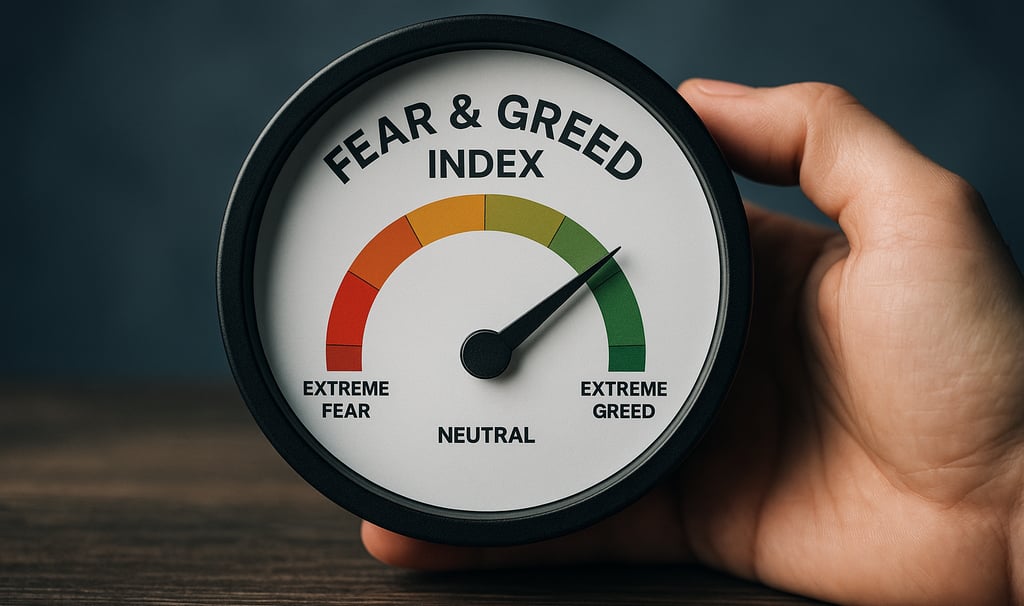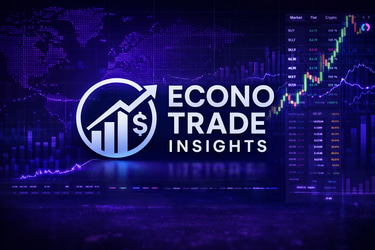Mastering the Fear and Greed Index: How to Navigate Emotional Trading in Financial Markets
11/6/20255 min read


Understanding the Fear and Greed Index
The Fear and Greed Index serves as a pivotal tool in financial markets, encapsulating investor sentiment through a numerical representation of emotions that critically drive market movements. This index is calculated based on several components that include market momentum, stock price strength, and volatility, among others. Each component reflects a different aspect of market behavior, integrating various market signals into a single figure. The resulting value can range from 0 to 100, where values closer to 0 indicate extreme fear among investors, whereas values approaching 100 signify rampant greed.
Fear and greed are fundamental emotions that significantly impact trading decisions and, consequently, market dynamics. When fear prevails, investors tend to sell off assets to mitigate losses, often leading to price declines. Conversely, when greed dominates, traders are more inclined to take risks, helping to fuel upward price movements. This sentiment dichotomy not only influences short-term trading strategies but also shapes long-term investment philosophies. For instance, during times of fear-induced market downturns, contrarian investors may view opportunities to acquire undervalued assets, thus illustrating how understanding the Fear and Greed Index can be effective for strategic positioning.
Historically, the Fear and Greed Index has proven to be a valuable indicator for traders and investors alike. As markets are often swayed by collective emotional responses, gauging sentiment through this index becomes crucial in understanding market volatility and potential price movements. Its current relevance is underscored by the increasing accessibility of real-time data analysis tools that allow individuals and institutions to monitor shifts in sentiment immediately. Thus, the Fear and Greed Index stands as not only a psychological measure but also an indispensable charting tool in the trader's arsenal for navigating the intricate web of emotional trading in financial markets.
The Psychological Impact of Fear and Greed on Trading Decisions
Trading in financial markets is not solely a mathematical endeavor; it is profoundly influenced by the psychological states of fear and greed. These emotions can significantly cloud a trader's judgment, leading to decisions that may be counterproductive in the long run. Fear often manifests as panic selling, where traders hastily liquidate their holdings during market downturns, driven by the urgency to avoid potential losses. This reaction tends to exacerbate declines, as widespread selling can contribute to further market instability. It is essential for traders to recognize when fear is driving their actions, as it can lead to substantial financial setbacks.
Conversely, greed can induce overconfidence during bullish markets. Traders may become overly optimistic, holding onto positions for too long, or taking on excessive risk in pursuit of higher returns. This behavior can result in significant losses when market conditions shift unexpectedly. By understanding the influence of these emotions, investors can develop strategies to identify and manage them effectively. The awareness of fear and greed can act as a safeguard against impulsive decision-making.
Moreover, traders often exhibit patterns influenced by these psychological drivers, such as herd behavior. This phenomenon occurs when individuals follow the majority, leading to exaggerated market movements. Recognizing the potential for such biases can help traders maintain a more rational approach, allowing them to rely on data-driven analysis instead of being swayed by emotional impulses.
By acknowledging the psychological traps inherent in trading, investors can cultivate greater emotional intelligence. This development enables them to respond to market fluctuations with a clearer mindset rather than being constrained by fear or overwhelmed by greed. Understanding these dynamics not only enhances trading performance but also contributes to overall financial well-being.
Strategies to Combat Emotional Trading
To effectively navigate the complexities of financial markets, traders must implement strategies that counteract the pervasive influence of fear and greed. One fundamental approach is the establishment of clear investment goals. By delineating specific, measurable objectives, traders can align their decisions with these goals, minimizing impulsive actions driven by emotional fluctuations. This clarity serves as a guiding framework, enabling traders to remain focused on long-term performance over short-term market volatility.
Additionally, employing robust risk management techniques is essential. This can include setting stop-loss orders to limit potential losses and defining position sizes appropriate to the trader's risk tolerance. By actively managing risk, traders are less likely to succumb to fear during detrimental market shifts, allowing for a more rational assessment of their investment positions. Moreover, diversifying one’s portfolio can also mitigate the emotional responses associated with market movements, as it spreads the risk over various assets.
Another effective strategy is the development of a disciplined trading plan. This plan should detail entry and exit strategies, as well as criteria for selecting trades based on research and data analysis, rather than emotional impulses. Adhering to this plan can help traders avoid pitfalls caused by momentary feelings of fear or greed driving their decisions. Furthermore, integrating tools such as trading journals can enhance emotional regulation by providing insights into trading behavior and identifying patterns of emotional decision-making.
Automated trading systems can also play a crucial role in reducing the impact of emotions on trading performance. By executing trades based on predefined criteria and algorithms, these systems help to eliminate emotional reaction from the trading equation. Finally, implementing emotional regulation techniques, such as mindfulness or cognitive behavioral strategies, can fortify traders against the irrational impulses associated with fear and greed. Ultimately, these strategies empower traders to take control of their emotional responses, leading to more prudent and informed trading decisions.
Taking Action: Recommended Resources for Traders
For traders seeking to enhance their trading acumen and manage the psychological aspects of trading, it is essential to leverage appropriate resources. One highly recommended trading platform is https://www.okx.com/. This platform stands out due to its user-friendly interface and advanced trading tools designed to assist traders in making informed decisions. Key features include real-time market analytics, comprehensive charting tools, and emotional management resources aimed at addressing the emotional challenges of trading, such as fear and greed. By utilizing this platform, traders can create strategies that not only mitigate emotional responses but also enhance overall trading effectiveness.
Alongside a robust trading platform, participation in an online academy at GO AI-ACADEMY can provide significant benefits. This academy offers an extensive curriculum covering various aspects of trading, from foundational principles to advanced strategies. Enrolling in this program can help traders deepen their understanding of market dynamics and the psychological factors influencing trading decisions. The lessons are designed to improve emotional resilience, helping traders develop techniques to cope with the inherent volatility of financial markets.
Moreover, community support through forums and peer interactions in the academy fosters an environment conducive to shared learning and accountability. By engaging with fellow traders, participants can exchange insights and strategies, further enhancing their skill set. Trading is not solely about understanding charts; it is equally about recognizing and managing one’s emotions. Therefore, taking action by utilizing supportive resources like a reputable trading platform and enrolling in a dedicated online academy is crucial for those looking to refine their trading approach.
To take the first step toward smarter trading, consider exploring the recommended platforms and educational resources. Empower yourself with the tools and knowledge necessary to navigate the complexities of emotional trading effectively.
EconoTrade Insights
Learn. Trade. Grow.
Empowering financial freedom through smart education and trusted tools.
© 2025 ECONO TRADE INSIGHTS. All rights reserved.
About - https://econotradeinsights.com/about-us-financial-blogging
Contact - econotradeinsights@gmail.com
Disclaimer - https://econotradeinsights.com/disclaimer
Terms & Conditions - https://econotradeinsights.com/terms-and-conditions
